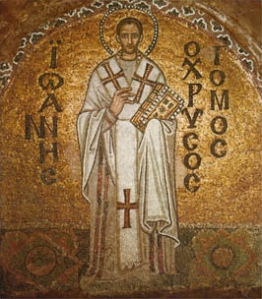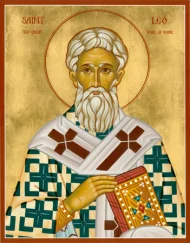 What does it mean, to say (as Saint Paul does) that: Reflecting the Lord’s glory, we are refashioned – transformed – to his likeness (2 Corinthians 3;18)?
What does it mean, to say (as Saint Paul does) that: Reflecting the Lord’s glory, we are refashioned – transformed – to his likeness (2 Corinthians 3;18)?
This was clearer in evidence when the grace of miracles was actively at work; but it is not hard to see even now, for anyone with the eyes of faith.
For on receiving baptism the soul shines brighter than the sun, being purified by the Holy Spirit; and not only do we behold God’s glory, but from it we receive a certain gleam ourselves.
Just as bright silver, when struck by beams of light, can send out beams in its turn, not simply of its own nature but from the sun’s brilliance, so also the soul, once purified and become brighter than silver, receives a beam from the glory of the Holy Spirit and sends that on.
That is why he says, Reflecting, we are refashioned he same pattern from – or of, or by – his glory, that of the Holy Spirit, into a glory, our own, which is contingent, modelled on the Spirit of the Lord.
See how he calls the Spirit “Lord,” or “Master.” He it is who transforms us, who does not permit us to conform to this world, the maker and first cause of creation as he is. As he says: You have been established in Christ Jesus.
This can be explained in more concrete terms from the apostles. We think of St. Paul, whose very clothes were activated; of St. Peter, whose very shadow had power.
That could never have been, if they had not borne the king’s likeness; if they had not had something of his unapproachable brightness – so much, it appears, that their clothes and their shadows worked wonders.
See how that brightness shines through their bodies! Gazing on the face of Stephen, he says, they seemed to see the face of an angel.
But that was nothing to the glory shining like lightning within. What Moses bore on his face, they carried in their souls, but to a much higher degree.
The mark on Moses was more tangible; but this was incorporeal. Dimly glowing bodies catch fire from brighter ones close by and pass on to others their own incandescence.
All that resembles what happens to the faithful. In this way they detach themselves from the world and have their converse only in the things of heaven.
John Chrysostom (c.347-407): From a Homily by Saint John Chrysostom on 2 Corinthians 3 @ Dom Donald’s Blog.









Thank you.
I always love St. John Chrysostom’s writing. I love his story of being so annoying in his sermons that he was exiled and died journeying in his last exile.
It is so hard to persist bringing the joy of God, not spirituality, to our loved ones in this murky weighty United States. Reading your entries keeps me light and energized.
Peace be with you.
Barbara